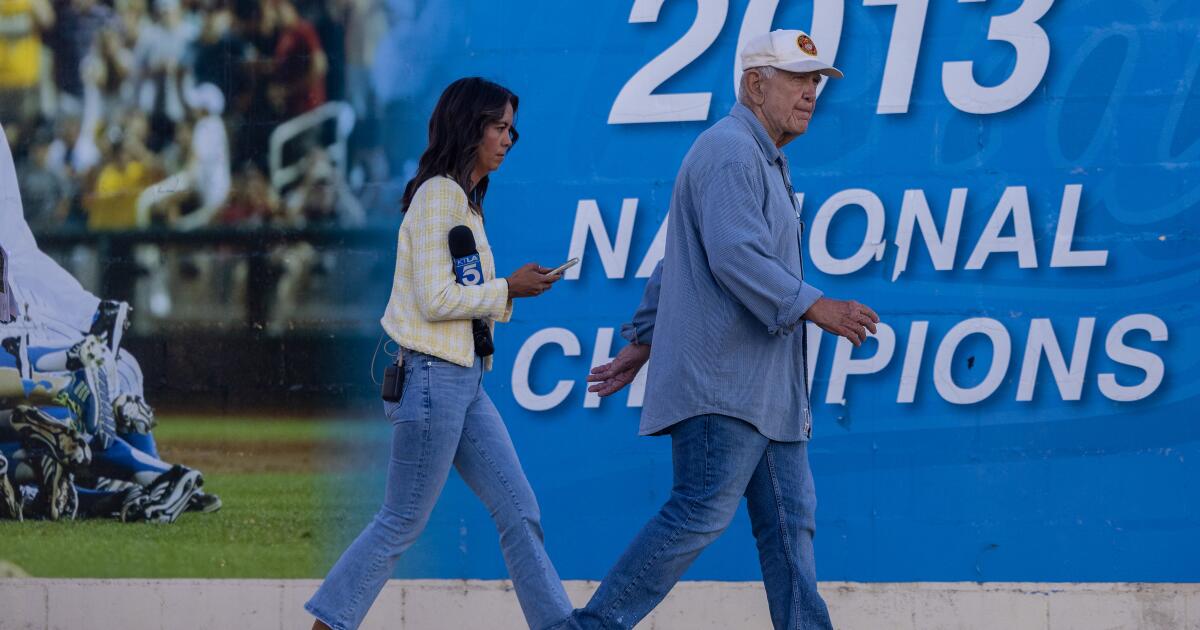

UCLA’s baseball program will be locked out of its stadium on Veterans Field on the west side of campus starting at noon today, under an order issued by a federal judge Wednesday night.
At the end of a nearly 11-hour hearing, U.S. District Judge David O. Carter read a brief ruling barring UCLA from accessing Jackie Robinson Stadium and an adjacent practice field until it produces a plan to his satisfaction to ensure that serving veterans is the predominant purpose of the 10-acre facility leased from the U.S. Department of Veterans Affairs.
Carter imposed the order shortly after UCLA interim Chancellor Darnell Hunt made a late appearance in court downtown in response to the judge’s warnings that he would lock down the facility if the chancellor did not show up.
Hunt, who arrived shortly before 7 p.m., stood silently as the university’s attorney pleaded with Carter to accept a proposal to expand services for veterans.
“It’s more than just a lease,” attorney Ray Cardozo said. “It’s a partnership. It’s a good fit from our perspective.”
Unconvinced, Carter read the four paragraphs in which he thanked Hunt for coming but declared the proposal inadequate.
“The VA has been ordered by noon tomorrow to lock down and prevent all use of the UCLA baseball stadium and practice field until further order of the court,” he said.
In a ruling after a four-week trial that ended earlier this month, Carter declared the UCLA lease illegal because its primary purpose was not to serve veterans. Under a slightly different legal standard, he also invalidated leases for the Brentwood school, an oil drilling operation and two parking lots, all illegal because they did not primarily serve veterans and their families.
The class action lawsuit alleged that the VA failed in its duty to provide adequate housing for disabled veterans and that its leases of portions of the 388-acre campus in West Los Angeles violated the land’s 1888 deed to the U.S. government for the “establishment, construction and permanent maintenance” of a home for disabled soldiers.
Carter ordered the VA to build 750 temporary housing units and 1,800 permanent housing units on campus, in addition to the 1,200 to 1,600 planned or under construction under a previous lawsuit.
He called the hearing on Wednesday to decide on an exit strategy for tenants and to select which plots would be used for housing.
At the start of the hearing, Carter said he hoped the parties would have worked out proposals that he would simply have to approve. Instead, the day turned into a lengthy back-and-forth in which attorneys for the government, veterans and tenants met in multiple groups at the courthouse to negotiate.
Carter repeatedly rejected their proposals.
Attorney Louis “Skip” Miller, who represents the Brentwood school, proposed giving back about five acres of its 22-acre lease for housing. That would include three of the six tennis courts, a parking lot and a softball field. It would also expand the hours during which veterans could use the facilities.
Carter rejected the proposal, saying he would not accept an exchange of five acres for 17, prompting Miller to apologize if he had given the impression that the land was intended for schools to be returned.
Carter repeatedly tried to steer the negotiations by issuing dire warnings about what he might do, then backing down with more conciliatory ideas about what he would do.
“If you don’t find something positive, these 22 acres are null and void,” he told Miller.
He has repeatedly said he would demolish or put sand in the Brentwood school’s 10-acre pool if it was “put in a box,” but then said he thought veterans would be very accommodating in allowing Brentwood students to use their facilities.
“Maybe we could work out an arrangement so the school could have him for half a day,” he said.
“I don’t want it to be like Vietnam, where they had to destroy everything to save it,” the Vietnam veteran said. “I don’t want to put sand in the pool.”
“We have to attract people. That’s why I want this pool, this track. Otherwise, everything will be razed.”
Later in the day, attorney Roman Silberfeld, representing the veterans, said a tentative agreement had been reached that would increase the school’s cash payment to the VA to a market rate and that a mechanism would be created for the VA to capture any portion of the land needed for housing.
Carter gave the parties more time to work out the details.
The only issue that was definitively settled Wednesday was the fate of Bridgeland Resources LLC’s oil drilling operations east of campus. Carter rejected a proposal by Bridgeland attorney Ernest Guadiana to trade an acre and a half of his property and increase royalties from 2.5 percent to 5.5 percent based on the price of oil.
Establishing a principle he interpreted as “primarily serving veterans,” Carter required Bridgeland to donate 51 percent of its gross revenue from the wells.
“Do I hear 51%?” he repeatedly asked Guadiana, who replied that this figure would bankrupt the company.
Recognizing that he has no jurisdiction over several older wells that draw water from beneath the campus, Carter ordered Bridgeland to plug the most productive well that draws water from beneath West Los Angeles.


